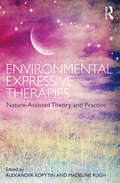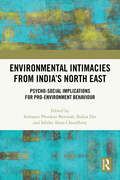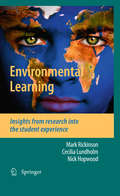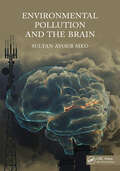- Table View
- List View
Entwicklung von Führungspersönlichkeiten und Führungskulturen
by Corinna Von AuDer vorliegende sechste Band der Reihe Leadership und Angewandte Psychologie reflektiert die in der Praxis bei Führungskräfteentwicklungsprogrammen oftmals vernachlässigten Aspekte – wie u. a. die Entwicklung der Selbstführung der Führungspersönlichkeiten sowie die parallele nachhaltige Entwicklung des gesamten Führungssystems – und gibt entsprechende Next Practice Impulse.
Entwicklung: Eine Einführung (Module Erziehungswissenschaft #2)
by Andrea Kleeberg-NiepageIn diesem Lehrbuch wird Entwicklung als wissenschaftliches Denkmodell zur Beschreibung des menschlichen Lebenslaufes wissenschaftshistorisch und konzeptionell eingeordnet. Zentrale Theorien menschlicher Entwicklung werden ebenso vorgestellt wie Konzeptionen zu Störungen von Entwicklungsprozessen. Zusammen mit Betrachtungen zum Stand der Forschung und der Forschungsmethoden liefert diese Einführung klar und verständlich zentrale Grundlagen, die Studierende in erziehungswissenschaftlichen, pädagogischen und sozialen Handlungsfeldern benötigen.
Entwicklungspsychologie des Jugendalters: Lesen, Hören, Lernen Im Web (lehrbuch Mit Online-materialien) (Springer-lehrbuch)
by Arnold LohausDieses Lehrbuch befasst sich mit der Entwicklungspsychologie des Jugendalters. Es vermittelt in verständlich geschriebenen Kapiteln Grund- und Anwendungswissen zu allen relevanten Entwicklungsbereichen und geht speziell auf für diese Lebensphase zentrale Themen ein, wie z.B. Medienkonsum, Sozialbeziehungen, Problemverhalten oder Berufswahl. Neben den wissenschaftlichen Grundlagen werden jeweils Bezüge zu konkreten Anwendungskontexten hergestellt.
Entwicklungspsychologie des Kindes- und Jugendalters für Bachelor
by Arnold Lohaus Marc VierhausDer Mensch entwickelt sich vor allem in früher Kindheit und Jugendalter rapide. Doch wann entwickelt sich was - und wie entwickelt es sich genau? Wie misst man Veränderungen oder den Entwicklungsstand? Welche Rolle spielen Erbgut und Umwelt? Dieses Lehrbuch beantwortet alle prüfungsrelevanten Fragen des psychologischen Grundlagenfachs "Entwicklungspsychologie", behandelt die zentralen Bereiche Motorik, Sensorik, Kognition, Intelligenz, Emotion, Sprache, Selbstkonzept, Moral, Eltern-Kind-Beziehung und gibt einen Überblick über entwicklungspsychologische Theorien, Methoden und Diagnostik. Es ist vollständig, sehr lernfreundlich durch zahlreiche Fallbeispiele, Definitionen, Lernziele, Kontrollfragen und vertiefende Literatur und gleichzeitig sehr kompakt: eine ausführliche Randspalte (fast-track) enthält das Wichtigste in Kürze - damit auch unter Zeitdruck alles Wesentliche hängenbleibt. Doch das Buch ist nur der halbe Spaß: Die begleitende Website www.lehrbuch-psychologie.de enthält Lerntools für Studierende und komplette Foliensätze für Dozenten zum Download. Alle Kapitel werden als Hörbeiträge zum Download im mp3-Format angeboten. Und ganz neu in der 2. Auflage: Viele Themen werden durch kurze Videos unterhaltsam erklärt und können - via QR-Codes im Buch - praktisch auf dem Smartphone angeschaut werden. - Das Beste: All das ist kostenlos! Lesen, Hören, Sehen, Lehren und Lernen im Web - mehr kann ein Lehrbuch nicht bieten.
Entwicklungspsychologie des Kindes- und Jugendalters für Bachelor
by Arnold Lohaus Marc Vierhaus Sakari LemolaDieses Lehrbuch vermittelt alles, was man für die Prüfungen im Fach Entwicklungspsychologie des Kindes- und Jugendalters wissen muss – so ausführlich wie nötig, so kompakt wie möglich und alles sehr verständlich: Neben dem Basiswissen zu grundlegenden Theorien, wie Entwicklung funktioniert, sowie den im Fach angewandten Methoden, widmen sich einzelne Kapitel der Entwicklung in zentralen Funktionsbereichen (Motorik, Sensorik, Kognition, Intelligenz, Emotion, Sprache, Selbstkonzept, Moral u.v.m.), Fragen der Eltern-Kind-Interaktion und Bindung, der Anlage-Umwelt-Debatte sowie Entwicklungsabweichungen im Kindes- und Jugendalter. Eine begleitende Website bietet kostenlose Lern- und Lehrmaterialien: Quizfragen, Lernkarten, Videos sowie exklusiv für Lehrende Foliensätze für die Vorlesung. Das Buch ist neben Psychologiestudierenden auch geeignet für Studierende der Erziehungswissenschaften und im Lehramtsstudium sowie für alle, die sich beruflich oder privat für die faszinierenden Entwicklungen im Kindes- und Jugendalter interessieren.
Entwicklungspsychologie des Kindes- und Jugendalters für Bachelor (Springer-Lehrbuch)
by Arnold Lohaus Marc VierhausDieses Lehrbuch vermittelt alles, was man für die Prüfungen im Fach Entwicklungspsychologie des Kindes- und Jugendalters wissen muss – so ausführlich wie nötig, so kompakt wie möglich und alles sehr verständlich. Eine Randspalte fasst die wichtigsten Fakten für Schnelllerner und zur Wiederholung zusammen. Eine prall gefüllte Begleitwebsite auf lehrbuch-psychologie.springer.com bietet Materialien zur Wissensüberprüfung, anschauliche Videos, Hörbeiträge und Foliensätze für die Lehre. Da ist alles drin!
Entwicklungspsychologie des Kindes- und Jugendalters für Bachelor: Lesen, Hören, Lernen im Web (Lehrbuch mit Online-Materialien) (Springer-Lehrbuch)
by Arnold Lohaus Marc VierhausDer Mensch entwickelt sich vor allem in früher Kindheit und Jugendalter rapide. Doch wann entwickelt sich was – und wie entwickelt es sich genau? Wie misst man Veränderungen oder den Entwicklungsstand? Welche Rolle spielen Erbgut und Umwelt? Dieses Lehrbuch beantwortet alle prüfungsrelevanten Fragen des psychologischen Grundlagenfachs "Entwicklungspsychologie", behandelt die zentralen Bereiche Motorik, Sensorik, Kognition, Intelligenz, Emotion, Sprache, Selbstkonzept, Moral, Eltern-Kind-Beziehung und gibt einen Überblick über entwicklungspsychologische Theorien, Methoden und Diagnostik. Es ist vollständig, sehr lernfreundlich durch zahlreiche Fallbeispiele, Definitionen, Lernziele, Kontrollfragen und vertiefende Literatur und gleichzeitig sehr kompakt: eine ausführliche Randspalte (fast-track) enthält das Wichtigste in Kürze - damit auch unter Zeitdruck alles Wesentliche hängenbleibt. Doch das Buch ist nur der halbe Spaß: Die begleitende Website www.lehrbuch-psychologie.de enthält Lerntools für Studierende und komplette Foliensätze für Dozenten zum Download. Alle Kapitel werden als Hörbeiträge zum Download im mp3-Format angeboten. Und ganz neu in der 2. Auflage: Viele Themen werden durch kurze Videos unterhaltsam erklärt und können - via QR-Codes im Buch - praktisch auf dem Smartphone angeschaut werden. – Das Beste: All das ist kostenlos! Lesen, Hören, Sehen, Lehren und Lernen im Web - mehr kann ein Lehrbuch nicht bieten.
Entwicklungspsychologie im Kindes- und Jugendalter: Deutsche Auflage unter Mitarbeit von Sabina Pauen
by Nancy Eisenberg Robert Siegler Elizabeth T. Gershoff Jenny R. SaffranDieses Standardwerk bietet allen, die sich beruflich oder privat für die Entwicklung im Kindes- und Jugendalter interessieren, umfassende Einblicke in den spannenden Prozess des Erwachsenwerdens. Die Autor*innen sind renommierte Wissenschaftler und Pädagogen. Sie haben diese Auflage grundlegend überarbeitet und um wichtige neue Informationen zur sozialen und emotionalen Entwicklung ergänzt. Studierende finden hier alles Wichtige für die Prüfung im Modul Entwicklungspsychologie: einen umfassenden Überblick über zentrale Konzepte, Theorien, Methoden und Ergebnisse entwicklungspsychologischer Forschung; geschrieben in einfacher und klar verständlicher Sprache; von Sabina Pauen, Professorin für Entwicklungspsychologie, für den deutschsprachigen Markt angepasst; mit Selbsttest-Fragen und Antworten über die Flashcards-App und mit hilfreichen Zusatzmaterialien über die Begleitwebseite. Eine Vielzahl an Illustrationen, Fallbeispielen und Praxisbezügen helfen dabei, den Stoff zu verstehen, zu strukturieren und zu verinnerlichen. So ist dieses Lehrbuch der Entwicklungspsychologie ein echtes Lese- und Lernvergnügen, auch für Laien. Die Inhalte des Werks gehen dabei weit über den klassischen Lehrstoff für Bachelor-Prüfungen hinaus; sie vermitteln ein vertieftes Verständnis dafür, wie die Entwicklung in unterschiedlichen Bereichen zusammenhängt, von welchen sozialen und gesellschaftlichen Rahmenbedingungen sie abhängt und wie die Entstehung von Problemen verhindert werden kann. Dieses Hintergrundwissen ist entscheidend für vielfältige Anwendungsfelder. Das Lehrbuch dient damit auch als wichtiges Nachschlagewerk im Master-Studium. Auch wenn Sie bereits beruflich oder privat mit Kindern und Jugendlichen zu tun haben, wird Ihnen das Buch Lust machen, mehr über die Prozesse und Mechanismen zu erfahren, die Entwicklung erst möglich machen, sie unterstützen oder auch behindern.
Entwicklungspsychologie: Ein Überblick Für Psychologiestudierende Und -interessierte (Was Ist Eigentlich ... ? Ser.)
by Jutta KrayDieses Lehrbuch aus der Reihe „Was ist eigentlich …?“ gibt einen kurzen Überblick über das Fach „Entwicklungspsychologie“. Es will Psychologiestudierenden am Beginn des Studiums bei der Orientierung helfen, was wichtig ist und worauf es in dem Fach wirklich ankommt. Es bietet aber auch für Fachfremde, die an psychologischen Themen interessiert sind, einen ersten, gut verständlichen Einblick in die aktuellen Denkweisen, Modelle und methodischen Herangehensweisen bei der Beschreibung, Erklärung und Erforschung menschlicher Entwicklung über die gesamte Lebensspanne.
Entwicklungspsychologie: Eine Einführung in die Erklärung menschlicher Entwicklung (Basiswissen Psychologie)
by Werner Greve Tamara ThomsenKlar, übersichtlich und in verständlicher Sprache führt dieses Buch in die Grundbegriffe, Theorien und Methoden der Entwicklungspsychologie ein und diskutiert grundlegende Forschungsansätze und -ergebnisse aus ausgewählten Funktions- und Altersbereichen. Studierende sollen so lernen zu verstehen, welchen Beitrag Entwicklungspsychologie zum Verständnis des Erlebens und Verhaltens leistet und welche Verbindungen zur Allgemeinen Psychologie, zur Sozialpsychologie und zur Differentiellen und Persönlichkeitspsychologie bestehen.
Entwicklungspsychopathologie und Psychotherapie: Kybernetische Modelle zur funktionellen Diagnostik bei Jugendlichen (essentials)
by Franz Resch Peter ParzerDas Essential vermittelt eine neue Betrachtungsweise in Bezug auf die Psychotherapie von Jugendlichen. Diese sollte nicht nur nosologisch ausgerichtet sein, sondern in der Indikation zu therapeutischen Maßnahmen darüber hinaus auch eine strukturelle undfunktionelle Analyse der Symptomatik berücksichtigen, um denEntwicklungsaufgaben, Lebensthemen und dem familiären beziehungsweise außerfamiliären Kontext - also den aktuellen Lebensbedingungen - der Jugendlichen Rechnung zu tragen. Kybernetische Modelle zum zielgerichteten Verhalten erlauben funktionelle Beschreibungen von Symptomverflechtungen, die sich einer direkten therapeutischen Beeinflussung entziehen und nur durch das Auffinden innerer Ziele, in deren Dienst sie stehen, über Verhaltensalternativen verändert werden können.
Entwicklungsstörungen in Grob-, Fein- und Grafomotorik: Grundlagen, Clinical Reasoning und Intervention im Kindes- und Jugendalter (essentials)
by Andreas LeschnikIn diesem essential werden die umschriebenen Entwicklungsstörungen der Grob-, Fein-, Grafo- und Schreibmotorik in Ihren Grundlagen und Entwicklungsstufen kurz erfasst. Im weiteren Verlauf bietet es die Möglichkeit die o.g. Entwicklungsstörungen mit dem hypothetisch-deduktiven Clinical Reasoning zu erfassen und Therapiemöglichkeiten aufzuzeigen.
Entwicklungsstörungen verstehen
by Oskar JenniDas kompakte Buch fasst das Praxiswissen über Entwicklungsstörungen im Kindes- und Jugendalter zusammen. Oskar Jenni gibt Einblicke in das Spektrum von Störungen der kindlichen Entwicklung, reflektiert über deren Zunahme, listet die verschiedenen Ursachen auf und stellt das diagnostische Vorgehen vor. Ausgewählte Entwicklungsstörungen werden prägnant und verständlich vorgestellt und mit anschaulichen Grafiken illustriert. Die Darstellung der Risiko- und Schutzfaktoren für die Entwicklung des Kindes sowie Überlegungen zur Förderung und Beratung runden dieses Praxisbuch ab. Das Werk eignet sich für die Kinder- und Jugendmedizin und für die Psychiatrie, Psychologie, Heilpädagogik, Logopädie, Ergotherapie, Psychomotorik, Physiotherapie und verwandte Disziplinen.
Enumerations: Data and Literary Study
by Andrew PiperFor well over a century, academic disciplines have studied human behavior using quantitative information. Until recently, however, the humanities have remained largely immune to the use of data—or vigorously resisted it. Thanks to new developments in computer science and natural language processing, literary scholars have embraced the quantitative study of literary works and have helped make Digital Humanities a rapidly growing field. But these developments raise a fundamental, and as yet unanswered question: what is the meaning of literary quantity? In Enumerations, Andrew Piper answers that question across a variety of domains fundamental to the study of literature. He focuses on the elementary particles of literature, from the role of punctuation in poetry, the matter of plot in novels, the study of topoi, and the behavior of characters, to the nature of fictional language and the shape of a poet’s career. How does quantity affect our understanding of these categories? What happens when we look at 3,388,230 punctuation marks, 1.4 billion words, or 650,000 fictional characters? Does this change how we think about poetry, the novel, fictionality, character, the commonplace, or the writer’s career? In the course of answering such questions, Piper introduces readers to the analytical building blocks of computational text analysis and brings them to bear on fundamental concerns of literary scholarship. This book will be essential reading for anyone interested in Digital Humanities and the future of literary study.
Environment And Behavior
by Donald M. BaerWe propose this book as a celebration of the outstanding research and teaching career of Professor Barbara Coleman Etzel. The editors and authors are her students and her worldwide colleagues. She directed us toward the issues of antecedent control at a time when we thought altering consequences could solve all problems. She developed a model of how a preschool teaching and research laboratory should be run by creating the very environmental controls evident in her work. This book is testimony to her influence on our professional careers and to our affection for her. Analysis of the way the environment influences behavior is essential to our understanding of human development. This volume collects original, never-published work that describes how people conceptualize, think, and behave. Environment and Behavior presents empirical studies that test theoretical assumptions and illustrate how to integrate environmental awareness into professional practice and design. The ability to categorize—to think in larger and more inclusive classifications and, at the same time, in smaller and more exclusive subdivisions—is a hallmark of conceptual development, It is the kind of development that makes humans distinctly rational, symbolic, and logical. This book presents a new way of viewing the conceptual development of normal and developmentally disabled children and the conceptual reorganization of adults. Individual conceptual ability is demonstrated across an impressive range of issues: private events, language development and function, child abuse, sexual abuse, drug abuse, autism, aging, professional practice, and environmental and cultural design. Additional commentary for each section is provided by the editors. Those working or studying in the areas of psychology, education, human development, social work, and disability will find this book to be a current and thorough introduction to the subject.
Environmental Arts Therapy: The Wild Frontiers of the Heart
by Gary Nash Ian Siddons HeginworthEnvironmental Arts Therapy: The Wild Frontiers of the Heart describes what happens when we take the creative arts therapies and the people whom we work with out of doors in order to provide safe, structured and accompanied creative therapeutic healing experiences. The theoretical themes are developed along with illustrated examples of clinical practice across a variety of settings and locations. The work is introduced and co-edited by a pioneer in the field, Ian Siddons Heginworth, who describes the emergence of environmental arts therapy and its growth across the British Isles supported through the training course based in London. The following 12 chapters are written by contributing authors and creative arts therapy practitioners working with children, adults and elders in schools, adult mental health and private practice in Britain and Europe. A central focus of the book is the clinical populations and settings in which clinicians work, and it also describes the health benefits as well as the challenges faced when working out of doors. This is a book about the emergence of a new creative therapy modality in the British Isles. It shows the value of working with the natural cycles and seasons, using an integrative arts approach including dramatic enactment, role-play, poetry, art-making with natural materials, storytelling, and the use of bodywork through movement, sound, rhythm and the voice, all held and reflected by our encounters with and in nature. It is about our relationship with nature, creativity and therapeutic healing and is written for trainers, trainees and practitioners in the creative arts, psychotherapy and ecotherapy.
Environmental Effects on Cognitive Abilities
by Robert J. Sternberg Elena L. GrigorenkoIt sometimes seems that it is difficult to pick up a current newspaper or a magazine without it containing a story about some behavioral characteristic for which it has been found that a gene is responsible. Even aspects of behavior that one would feel certain are environmentally controlled are now being attributed in part to the effects of the genes. But genes never act alone: Their effects are always filtered through the environment. The goal of this volume is to discuss how the environment influences the development and the maintenance of cognitive abilities. It is a successor to the editors' 1997 volume, Intelligence, Heredity, and Environment, and a companion to their new volume, Family Environment and Intellectual Functioning: A Life-Span Perspective. Taken together, the two-volume set comprises the most comprehensive existing work on the relation between the environment and cognitive abilities. Psychologists, parents, social workers, educators, and employers are all likely to find this book of interest.
Environmental Expressive Therapies: Nature-Assisted Theory and Practice
by Madeline Rugh Alexander KopytinEnvironmental Expressive Therapies contributes to the emerging phenomenon of eco-arts therapy by highlighting the work that international expressive arts therapists have accomplished to establish a framework for incorporating nature as a partner in creative/expressive arts therapy practices. Each of the contributors explores a particular specialization and outlines the implementation of multi-professional and multi-modal "earth-based" creative/expressive interventions that practitioners can use in their daily work with patients with various clinical needs. Different forms of creative/expressive practices—such as creative writing, play therapy techniques, visual arts, expressive music, dramatic performances, and their combinations with wilderness and animal-assisted therapy—are included in order to maximize the spectrum of treatment options. Environmental Expressive Therapies represents a variety of practical approaches and tools for therapists to use to achieve multiple treatment goals and promote sustainable lifestyles for individuals, families, and communities.
Environmental Factors in the Pathogenesis of Cardiovascular Diseases (Advances in Biochemistry in Health and Disease #30)
by Devendra K. Agrawal Dragan M. DjuricEnvironmental conditions and processes are one of the major pillars on which the human well-being rests. It is the core responsibility of the society to preserve and enhance better conditions for the human well-being. Indeed, there are several evolving unmet needs in public health. Emerging and re-emerging infectious diseases and a surge in the incidence of non-communicable diseases, including cardiovascular diseases (CAD), chronic respiratory diseases, and metabolic diseases have been impediments to sustainable well-being. Many factors are critical in the global surge in the rate and incidence of cardiovascular diseases. These include the shift from acute to chronic conditions, the shift from single risk factor vs. multiple influences, aging population, global health disparities, exposure to lower harmful influences over a longer period, etc. However, the epigenetic factors due to unhealthy environment play a most significant role in the underlying pathogenesis of cardiovascular diseases. Unfortunately, this has been ignored for a long time and realized lately to expand and disseminate knowledge to general population, expand research activities to investigate the cellular and molecular mechanisms, and develop better preventive and treatment strategies. The most significant environmental impoverishment in the pathogenesis of cardiovascular diseases include different genetical, chemical, physical, and biological influences, but not limited to, socio-economic status and lack of nutrients, nutritional aspects including habits, diets and additives, inhaled and ingested pollutants, exhaust gas and gasoline products, tobacco smoke, water pollution, alcohol consumption, soil and mineral pollution, solvents, pesticides, microplastics, non-critical usage of drugs, climate change, extreme atmospheric conditions, extremes in noise and temperature, electromagnetic influences, microwaves and radiation, outdoor light pollution, mental stressors, lack of or over exercise, microbiota and microbiological agents like SARS CoV-2 virus, etc.
Environmental Impacts on Families: Change, Challenge, and Adaptation (National Symposium on Family Issues #12)
by Valarie King Susan M. McHale Jennifer E. Glick Selena E. OrtizThis book examines ways in which families’ physical environments have implications for their relationships and the health and well-being of their members. Attention is given to three aspects of the physical environment—disasters, climate change, and the built environment—and the challenges these may create for families. Chapters describe particular considerations within each of these three physical environment challenges, the ways they affect families, and factors that protect families, promote their resilience and enable them to flourish. Finally, the volume offers recommendations for the role of government programs and policies to support families to overcome and/or adapt to environmental challenges as well as highlights the efficacy of evidence-based interventions aimed at promoting family resilience.Featured areas of coverage include: Extreme natural events and families’ postdisaster recovery.Family adaptations to climate change.The built environment and children’s health and well-being.Community-driven approaches to address environmental inequities.The urban environment of family caregiving. Environmental Impacts on Families is a must-have resource for researchers, professors, and graduate students as well as clinicians, therapists, policymakers, and other related professionals in developmental psychology, family studies, environmental health and policy, social work, public health, educational policy and politics, economics, migration studies, and all interrelated disciplines.
Environmental Intimacies from India’s North East: Psycho-Social Implications for Pro-Environment Behaviour
by Indranee Phookan Borooah Sabiha Alam Choudhury Bidita DasThis book explores the intimate relationship of the people of North East India with the environment as evinced from their traditional beliefs, cultural practices, and livelihood. It offers insights into the challenges and adaptability of communities through actions ensuring conservation of the environment yet sustaining their livelihood.The book encompasses movement toward responsible actions and the engagement of communities in pro-environmental behavior. It showcases the various practices, knowledge, and debates on the environment-behavior relationship of the people of North East India. It brings into focus some of the daunting environmental issues and the endeavors for sustenance that is true to a region which is rich in ecological diversity and touches the spirit and psyche of its people.This volume will be of interest to scholars and researchers of psychology, anthropology, sociology, environmental sciences, development studies, law and governance, environmental administration, and South Asia studies.
Environmental Learning: Insights from research into the student experience
by Cecilia Lundholm Mark Rickinson Nick HopwoodEnvironmental education and education for sustainable development have become features of many countries' formal education systems. To date, however, there have been few attempts to explore what such learning looks and feels like from the perspective of the learners. Based on in-depth empirical studies in school and university classrooms, this book presents rich insights into the complexities and dynamics of students' environmental learning. The authors show how careful analysis of students' environmental learning experiences can provide powerful pointers for future practice, policy and research. Environmental Learning will be a key resource for educators, teacher educators, decision-makers and researchers involved in education and sustainable development.
Environmental Melancholia: Psychoanalytic dimensions of engagement (Psychoanalytic Explorations)
by Renee LertzmanIn this groundbreaking book, Renee Lertzman applies psychoanalytic theory and psychosocial research to the issue of public engagement and public apathy in response to chronic ecological threats. By highlighting unconscious and affective dimensions of contemporary ecological issues, Lertzman deconstructs the idea that there is a gap between what people care about and what is actually carried out in policy and personal practice. In doing so, she presents an innovative way to think about and design engagement practices and policy interventions. Based on key qualitative fieldwork and in-depth interviews conducted in Green Bay, Wisconsin, each chapter provides a psychosocial, psychoanalytic perspective on subjectivity, affect and identity, and considers what this means for understanding behaviour in relation to environmental crises and climate change. The book argues for a theory of environmental melancholia that accounts for the ways in which people experience profound loss and disruption caused by environmental issues, and yet may have trouble expressing or making sense of such experiences. Environmental Melancholia offers a fresh perspective to the field of environmental psychology that until now has been largely dominated by research in cognitive, behavioural and social psychology. It will appeal to academics, researchers and postgraduate students in the fields of psychoanalysis, psychosocial studies and sustainability, as well as policy makers and educators internationally.
Environmental Noise Control: The Indian Perspective in an International Context
by Naveen GargThis book provides a concise and up-to-date overview of environmental noise control issues, utilizing specific case studies from India to help explore noise mapping and monitoring, impact analysis, and policy, among other relevant topics. The book provides an extensive review of recent studies, including references, and describes the latest noise monitoring structures. It also addresses heretofore under-emphasized topics, including but not limited to acoustic metrology, Multi Attribute Decision Making (MADM) techniques, and sound insulation utilizing passive control strategies.
Environmental Pollution and the Brain
by Sultan Ayoub MeoEnvironmental pollution is an emerging global public health problem of both developing and developed nations. Such pollution is a major risk factor for many illnesses, including nervous system disorders. This book combines the highlights the effects of environmental pollution on brain biology. It will be a thorough overview of the pathophysiological and oxidative stress mechanisms and how environmental pollution affects the brain biology. The author discusses environmental pollution and brain development, memory, autism, hearing and vision loss and brain cancer. Several chapters address controversial topics such as the effect of Electromagnetic Field Radiation (RF-EMFR).
